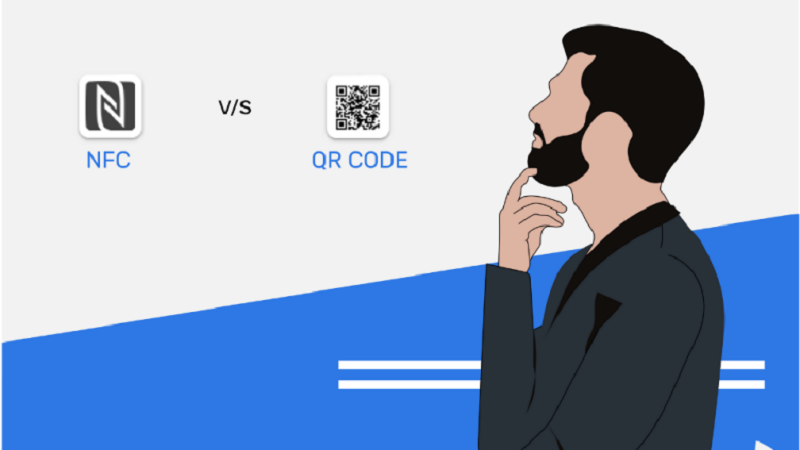QR Codes vs. NFC: Choosing the Best Technology for Nepalese Banks’ Future
22nd August 2023, Kathmandu
In this era of digital transformation, technological advancements are revolutionizing various industries, including banking.
The adoption of cutting-edge technologies like NFC (Near Field Communication) and QR (Quick Response) codes is reshaping customer experiences and streamlining processes within the banking sector.
QR Codes vs. NFC
The selection between QR codes and NFC holds profound implications for the future of banking operations in Nepal. In this article, we delve into the intricacies of these technologies, analyzing their suitability, advantages, and limitations concerning Nepalese banks.
1. Understanding QR Codes and NFC:
QR codes are two-dimensional barcodes scanned by smartphone cameras to access information swiftly. On the other hand, NFC enables seamless wireless communication between devices in close proximity. Both technologies aim to simplify interactions, with QR codes bridging the gap between physical and digital realms, while NFC facilitates secure data exchange for applications like mobile payments and access control.
2. Banking Transformation in Nepal:
Driven by smartphone adoption and a demand for convenience, Nepal’s banking sector is undergoing a digital metamorphosis. The Payment System Oversights Report 2021/22 by NRB reveals a significant surge in the number and value of QR code-based transactions, reflecting the growing appetite for digital solutions.
3. Advantages of QR Codes for Nepalese Banks:
Cost-Efficiency:
QR code implementation aligns with the budget-conscious nature of many Nepalese banks.
Widespread Adoption:
The ubiquity of QR code scanning functionality across smartphones enhances accessibility.
Offline Transactions:
QR codes accommodate Nepal’s diverse landscape by enabling offline transactions.
User Familiarity:
Scanning QR codes resonates with users, narrowing the digital divide.
4. QR Code Limitations in Banking:
Security Concerns:
Data breaches and scams associated with QR codes can undermine customer trust.
Data Capacity Limitation:
QR codes have limited data capacity, restricting their use for complex transactions.
5. Benefits of NFC Technology for Nepalese Banks:
Enhanced Security:
NFC’s short-range communication ensures robust transaction security.
Speed and Efficiency:
NFC transactions outpace QR codes, bolstering operational efficiency.
Contactless Experience:
NFC aligns with the trend of contactless banking, offering a seamless user experience.
6. NFC Challenges and Considerations:
Initial Costs:
NFC implementation demands investments in hardware and infrastructure.
Device Compatibility:
Not all smartphones support NFC technology, potentially limiting user reach.
Integration Complexity:
Integrating NFC into existing systems necessitates meticulous planning and execution.
7. Understanding Customer Preferences and Adoption:
A recent NRB survey unveils that 70% of respondents in Nepal favor QR codes due to familiarity and ease of use. However, 30% expressed concerns about QR code transaction security, indicating the importance of a balanced decision-making process.
8. Tailoring Solutions: Merging QR Codes and NFC:
A hybrid strategy that harnesses the benefits of both QR codes and NFC can provide a versatile solution. While NFC may suit high-value or security-demanding transactions, QR codes can handle routine purchases.
9. Security and Trust in Banking Transactions:
Ensuring robust encryption for both QR and NFC transactions is crucial for building and maintaining customer trust. Given Nepal’s cybersecurity concerns, NFC’s security features and continuous enhancements make it an attractive option.
10. Data Insights: Potential Adoption of QR Codes and NFC Payments:
70% of Nepalese adults own smartphones, indicating a sizable market for QR code payments. 50% of Nepalese consumers express interest in contactless payment methods, signaling demand for NFC payments. QR code payments are cost-effective and suitable for banks with limited budgets. While NFC payments involve higher implementation costs, their speed, and convenience provide distinct advantages.
11. Future Trends and Recommendations:
With Nepal’s banking landscape in flux, a hybrid approach leveraging QR codes and NFC seems promising. This enables banks to offer a range of services tailored to diverse customer needs.
The choice between QR codes and NFC for Nepalese banks is a multifaceted decision that considers technology capabilities, user preferences, security, and finances. While NFC ensures heightened security and user experience, QR codes offer accessibility and cost-effectiveness.
A balanced solution that merges both technologies could best cater to the evolving needs of Nepalese banks and clients, shaping the future of banking in Nepal.
For more details: Click Here







